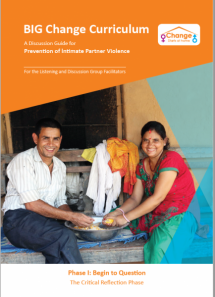Change Starts at Home B.I.G Change Curriculum
The Change Starts at Home intervention was created in Nepal to address the large percentage of women affected by intimate partner violence. Focused on an innovative radio program and weekly listening and discussion group meetings, the Change Starts at Home approach uses media and peer to peer support to address social norms, attitudes, and behaviors that perpetuate and support intimate partner violence.
At the heart of the approach is this BIG (B: Begin to Question, I: Impart Life Skills and G: Go!) Change curriculum. This 9 month, interactive curriculum was developed for the facilitators of the Change Starts at Home Listening and Discussion Groups (LDGs). It is designed to support weekly facilitated sessions with group members that run in parallel to the radio program.
Change Starts at Home is one of the first interventions of its kind in Nepal to take a multi-pronged approach to IPV, working simultaneously with couples, families and community leaders to drive a change in community attitudes towards violence against women and girls. Whilst the project’s main objective is to give married couples the knowledge, skills, and space to safely address power imbalances in their relationships, the impact is reinforced by activities that aim to bring couples, their family members and community leaders together in a movement to change social attitudes and practices towards girls and women in Nepal.
The impact of the project is being rigorously evaluated using a Randomised Control Trial to examine potential pathways of change.
The project is implemented by Equal Access International and funded by UK aid from the UK government, via the What Works to Prevent Violence Against Women and Girls Global Programme. The funds were managed by the South African Medical Research Council. The views expressed do not necessarily reflect the UK government’s official policies.’ The BIG Change Curriculum is also available in Nepali. For more information contact gferguson@equalaccess.org / Bshrestha@equalaccess.org
Source: Equal Access International
Date of Publication: March 25, 2019
SIMILIAR RESOURCES
Tools
Examples
- The REPLACE Approach: Supporting Communities to End FGM
- Think BIG tool: Prioritizing and Integrating Behaviors
- Gender Transformation for Health A Participatory Toolkit
- DHIS2 Software Operational Guideline Nepal
- Manual on Social Norms and Change
- COVID-19: Emerging Gender Data and Why it Matters
- 18F Methods Cards
- Gender-based Violence Prevention, Risk Mitigation and Response during COVID-19
- Promoting the Health of Men who Have Sex with Men Worldwide: A Training Curriculum for Providers
- Gender, Health and COVID-19

